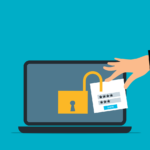Cyber threats pose a significant risk to businesses of all sizes. With the increasing reliance on digital data and technology, protecting sensitive information from cyberattacks has never been more critical. Business owners must take proactive steps to secure their data and avoid potentially devastating breaches.
Implementing strong security measures can help safeguard your business data from cyber threats. From controlling access to sensitive information to educating employees about cybersecurity best practices, these steps can make a big difference in your data security. Additionally, using encryption and keeping your systems updated can further enhance your protection against hackers and other malicious actors.
This article will explore ways to protect business data from cyber threats, providing practical strategies that can be easily implemented. By following these recommendations, you can take control of your business’s cybersecurity and ensure that your sensitive information remains safe and secure.
Implement Strong Access Controls
Restricting access to sensitive data is essential for protecting your business from cyber threats. Implementing strong access controls can help ensure that only authorized individuals can access important information. Here are several practices to consider:
Role-Based Access Control (RBAC): Assign access permissions based on employees’ roles and responsibilities within the company. This limits access to only the information necessary for each role, reducing the risk of unauthorized access.
Multi-Factor Authentication (MFA): Use MFA to add an extra layer of security. This requires users to provide two or more verification factors to gain access. MFA typically includes something the user knows (password), something the user has (a smartphone), or something the user is (fingerprint), making it harder for cybercriminals to access your data.
Access Audits: Regularly review access logs to monitor who has accessed sensitive data. Conduct periodic audits to ensure that access permissions remain appropriate and that no unauthorized access has taken place. Adjust permissions as necessary to maintain security.
Use Encryption for Sensitive Data
Encrypting sensitive data is another vital step in protecting your business from cyber threats. Encryption converts data into a code, preventing unauthorized users from reading it without the encryption key. Here’s how you can use encryption effectively:
Encrypt Data at Rest: Ensure that data stored on servers, databases, and devices is encrypted. This means that even if a cybercriminal gains physical access to the storage medium, they cannot read the information without the encryption key.
Encrypt Data in Transit: Secure data as it moves across networks. Use protocols like HTTPS, SSL/TLS, and VPNs to encrypt data during transmission. This prevents cybercriminals from intercepting and reading the data while it is being sent between systems.
Regularly Update Encryption Methods: Encryption algorithms evolve, and older algorithms may become vulnerable over time. Stay current with the latest encryption standards and update your methods to ensure ongoing protection.
By implementing strong access controls and using encryption for sensitive data, you can significantly bolster your business’s defenses against cyber threats. These measures will help protect your valuable information from unauthorized access and potential data breaches.
Train Employees on Cybersecurity Best Practices
One of the most effective ways to protect business data is by training employees on cybersecurity best practices. Staff members are often the first line of defense against cyber threats, so equipping them with the right knowledge can make a significant difference. Here are some key training topics to consider:
Recognize Phishing Scams: Teach employees how to identify phishing emails and messages. This includes checking for unusual sender addresses, poor grammar, and unexpected requests for personal or sensitive information.
Strong Password Practices: Educate employees on creating strong, unique passwords and the importance of changing them regularly. Encourage using passphrases and password managers to enhance security.
Safe Internet Habits: Train staff to be cautious when browsing the internet, downloading files, or clicking on links. Emphasize the importance of using secure websites and avoiding suspicious links.
Incident Reporting: Ensure employees know how to report suspicious activities, potential security threats, and phishing attempts promptly. A clear reporting process can help address issues before they escalate.
Regularly Update and Patch Systems
Keeping systems up-to-date is critical for defending against cyber threats. Updates and patches often include fixes for security vulnerabilities that cybercriminals could exploit. Below are key practices for maintaining updated systems:
Automate Updates: Enable automatic updates for operating systems, software, and applications. This ensures that your systems receive the latest security patches without manual intervention.
Patch Management: Develop a patch management strategy to regularly review and apply updates to all systems. Assign a team or individual responsible for overseeing the patching process and ensuring timely updates.
Third-Party Software: Don’t forget about third-party applications and plugins. These tools can also have vulnerabilities and need regular updates and patches to remain secure.
Test Updates: Before applying updates broadly, test them on a small batch of systems to ensure they don’t cause disruptions. This helps maintain stability while keeping systems secure.
Conclusion
Protecting business data from cyber threats requires a comprehensive strategy. By implementing strong access controls, using encryption, training employees, and regularly updating systems, you can create a robust defense against potential cyberattacks. Each of these measures plays a crucial role in safeguarding your sensitive information.
Staying proactive and practicing cybersecurity for your business will help you avoid costly breaches and keep your business running smoothly. At Alliance TechSolutions, we understand the importance of protecting your data. Contact us today for expert assistance in securing your business against cyber threats and keeping your data safe in 2024 and beyond.




